High-quality macro lenses for perfect close-ups.
If you are in search of the best macro lens and have even a shadow of doubt about your purchase, this article will come in handy. Here you can read brief overviews about the most popular models that will help you take breathtaking macro photos and close-ups.
All the lenses listed below have the most commonly used types of mounting. Such brands as Tamron and Sigma produce lenses for macro photography that are compatible with a variety of cameras. So, here you can read about the models from third-party manufactures and such purpose-built options from Olympus, Irix, Canon, and Rokinon.
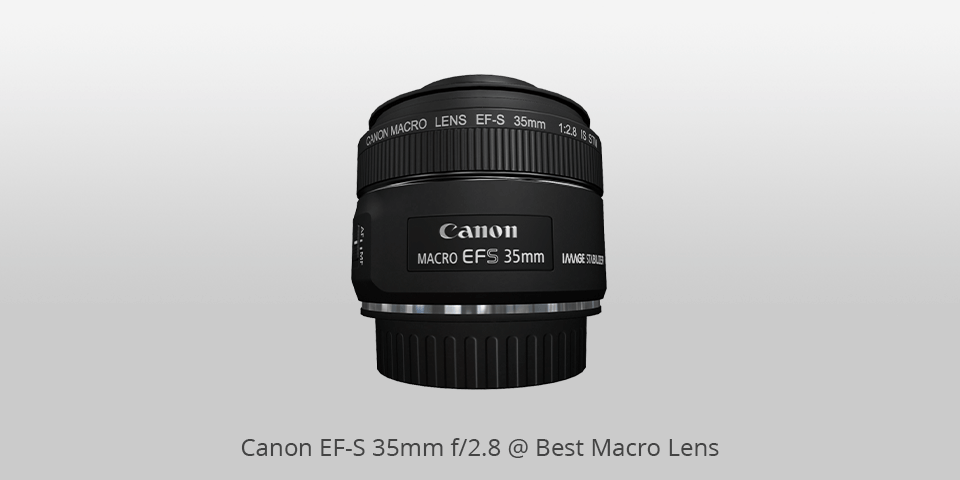
Mount: Canon EF-S | Diaphragm blades: 7, Rounded | Autofocus: Yes | Min focus distance: 13 cm | Max magnification: 1x | Filter size: 49 mm (Front) | Dimensions (ø x L): 69.2 x 55.8 mm | Weight: 190 g
⊕ Close minimum focus distance
⊕ Can work as a wide-angle lens
⊕ Compact
⊕ Sharp results
⊖ Slim focus ring
⊖ Plastic body
Canon EF-S 35mm f/2.8 Macro IS STM impresses with its 56mm equivalent focal length, which gives you incredible flexibility to photograph close subjects. Built-in LED lights allow you to take fantastic product or macro shots without the need to spend additional money on the lighting system. This macro lens produces sharp results across the entire image with a beautifully blurred background and a pretty small depth of field. Canon EF-S 35mm f/2.8 comes with a stabilization system, which is especially handy in the macro mode to stabilize the image and get low shutter speeds.
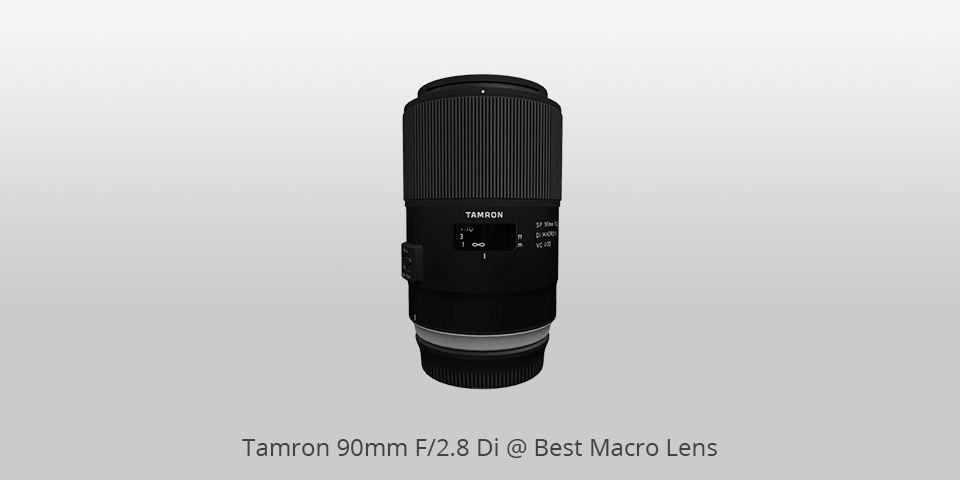
Mount: Nikon F | Diaphragm blades: 9, Rounded | Autofocus: Yes | Min focus distance: 30 cm | Max magnification: 1x | Filter size: 62 mm (Front) | Dimensions (ø x L): 79 x 122.9 mm | Weight: 600 g
⊕ Efficient VC (Vibration Compensation)
⊕ Internal focusing system
⊕ Weatherproof body
⊕ Ability to limit the focusing distance
⊖ Produces worse bokeh than previous models
⊖ Slow autofocus system
If you are looking for the best macro lens, consider investing in Tamron 90mm F/2.8 Di. You will get a high-quality lens with 90mm-105mm focal length coverage to produce spectacular portrait and macro photos. It delivers incredibly sharp results (you can always add some out-of-focus elements in the image, but raising sharpness may be difficult). Also, Tamron 90mm F/2.8 Di delivers outstanding color reproduction.
A close focus distance allows you to achieve a higher level of detail in your photos that you can't get with the majority of telephoto lenses. Feel free to shoot in any weather conditions since the lens has weather-resistant construction. Tamron 90mm F/2.8 Di is an all-in-one solution that allows you to photograph landscapes with a large depth of field and shoot shallow depth-of-field detail pictures without the need to change the optics. This model boasts first-class resolving power and a great stabilization system, making it a perfect option for taking photos and recording videos.
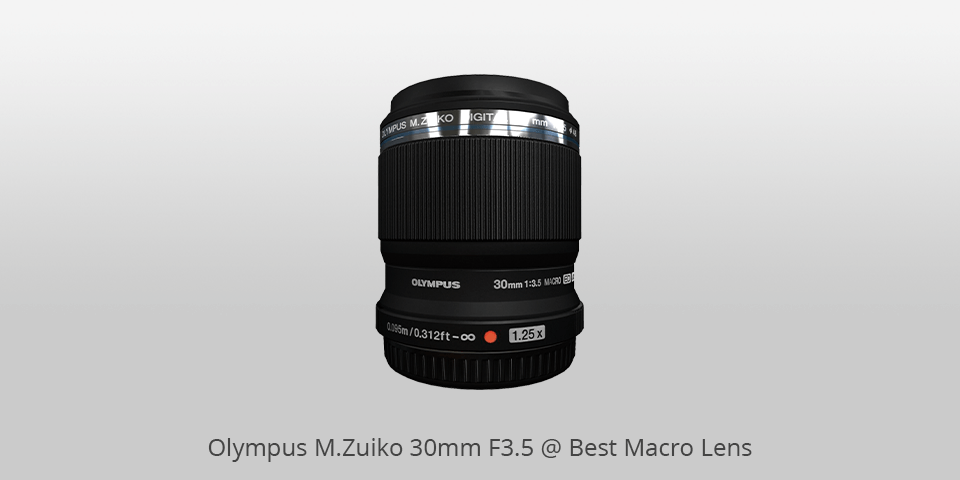
Mount: Micro Four Thirds | Diaphragm blades: 7, Rounded | Autofocus: Yes | Min focus distance: 9.5 cm | Max magnification: 1.25x | Filter size: 46 mm (Front) | Dimensions (ø x L): 60 x 57 mm | Weight: 128 g
⊕ Excellent sharpness from edge to edge
⊕ Compact
⊕ Portable
⊕ Max image magnification of 2.5x
⊖ Lacks image stabilization
⊖ Doesn’t produce bright images
Olympus M.ZUIKO 30mm F3.5 is a powerful lens for macro photography. Since it doesn’t offer OS system, it will better work with cameras that offer built-in image stabilization. Nevertheless, this Olympus lens has numerous advantages such as excellent image quality and super-macro image magnification that allows you to get closer to your subjects than ever before. With the shortest working distance and 30mm focal length, you can capture the tiniest of details in your images. Moreover, you can use Olympus M.ZUIKO 30mm F3.5 for general purposes and enjoy sharp results.
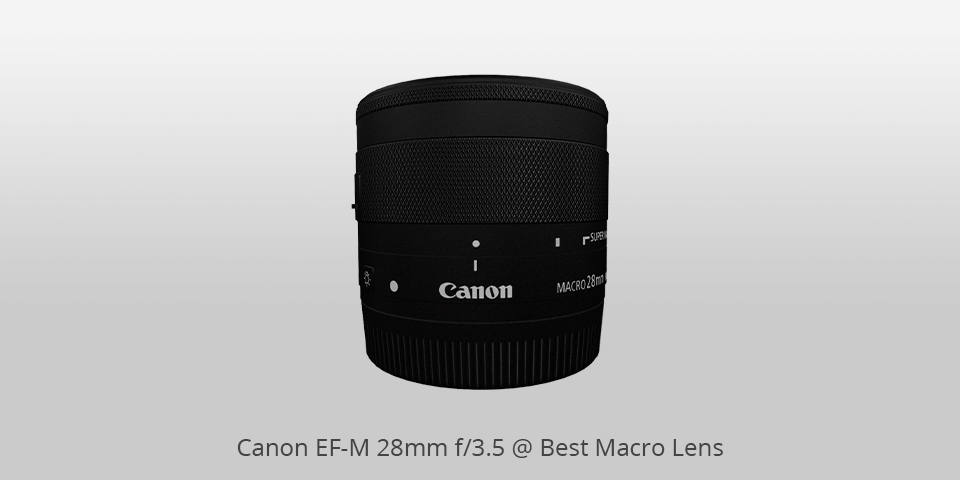
Mount: Canon EF-M | Diaphragm blades: 7 (Circular) | Autofocus: Yes | Min focus distance: 9.3 cmm | Max magnification: 1.2x | Filter size: 43 mm (Front) | Dimensions (ø x L): 60.9 x 45.5 mm | Weight: 130 g
⊕ Built-in macro light
⊕ Compact
⊕ Super Macro Mode
⊕ Integrated LED semi-ring lights
⊖ Poor image stabilization
⊖ Weak AF system
For this price bracket, Canon EF-M 28mm f/3.5 impresses with its capabilities. Small size, outstanding optics, great performance, these are just some advantages of this budget macro lens. Nevertheless, the most distinctive feature of this model is the built-in LED semi-ring lights. If you have Canon EOS M series and looking for a compact macro lens, EF-M 28mm f/3.5 is a decent option to consider. This model is compatible only with cameras of the Canon M series. You can’t attach it to Canon EOS DSLR cameras.
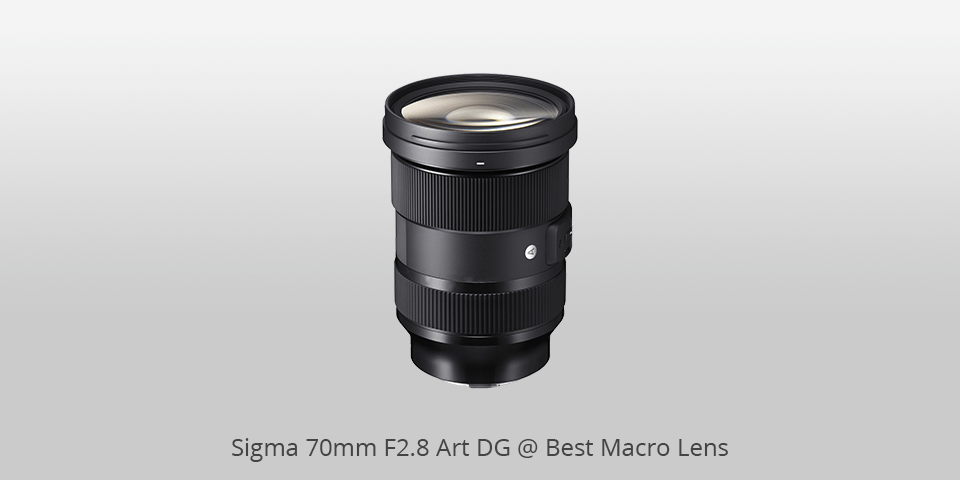
Mount: Sony E | Diaphragm blades: 9, Rounded | Autofocus: Yes | Min focus distance: 25.8 cm | Max magnification: 1x | Filter size: 49 mm (Front) | Dimensions (ø x L): 70.8 x 105.8 mm | Weight: 515 g
⊕ Well-controlled chromatic aberration
⊕ Excellent sharpness
⊕ Flare-resistant
⊕ Beautiful and smooth bokeh
⊖ Doesn’t have image stabilization
Sigma has designed a powerful and robust lens for close up photography that produces exceptional image quality. Although it has a bit slow AF system, the overall lens performance is impressive. The 70mm focal length is a great choice for full-frame cameras. Sigma 70mm F2.8 Art DG offers functionality and capabilities that you can expect from the macro lens. Also, you can use it as a replacement for the regular focal lengths optics.
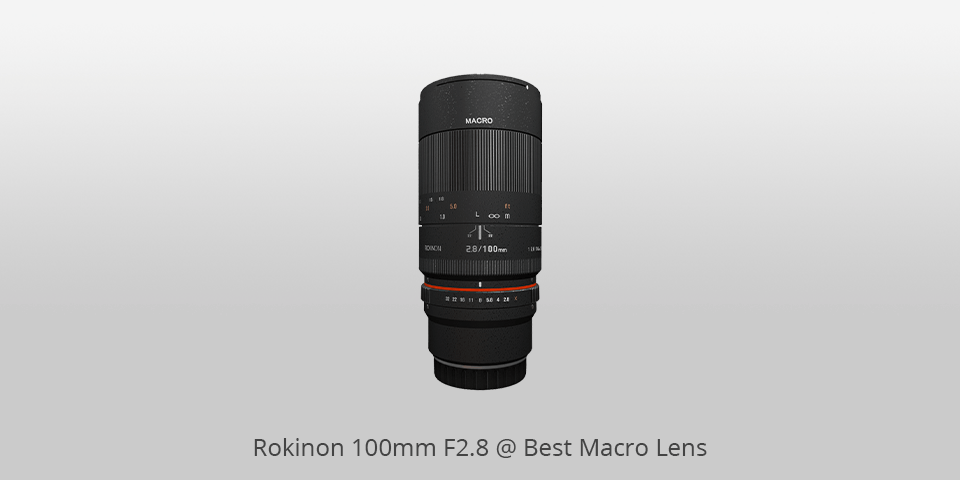
Mount: Sony E | Diaphragm blades: 9, Rounded | Autofocus: No | Min focus distance: 30.7 cm | Max magnification: 1x | Filter size: 67 mm (Front) | Dimensions (ø x L): 72.5 x 149.1 mm | Weight: 730 g
⊕ Sharpness improves when stopping down
⊕ 1:1 magnification ratio
⊕ Can work with multiple systems
⊕ Long focus throw
⊖ Doesn’t include AF system
⊖ No optical stabilization
Rokinon 100mm F2.8 delivers sharp results from corner to corner of the frame. If you work with the small apertures to magnify the subject, you will get a crisp and high-quality image as well. Rokinon 100mm F2.8 performs excellently at all apertures up to f/16. The strongest drawback of this macro lens is that it doesn’t have built-in autofocus. However, the manual focus will come in handy if you attach the camera to a tripod and use a Live View mode to enable accurate focusing.
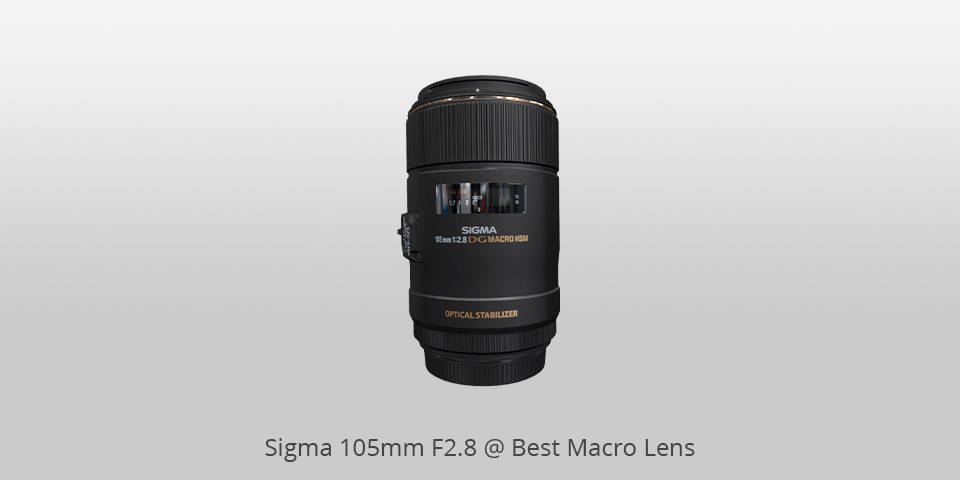
Mount: Canon EF | Diaphragm blades: 9, Rounded | Autofocus: Yes | Min focus distance: 31.2 cm | Max magnification: 1x | Filter size: 62 mm (Front) | Dimensions (ø x L): 78.3 x 126.4 mm | Weight: 725 g
⊕ Weather-resistant construction
⊕ Ability to limit focus distance
⊕ Compatible with full-frame sensors
⊕ Full-time manual focus
⊖ Heavyweight
Sigma 105mm F2.8 EX DG OS HSM is a macro prime lens with an excellent autofocus system designed for cameras with 35mm full-frame image sensors. If you attach this Sigma model to 35mm full-frame camera, you will achieve a long 150mm equivalent focal length. This is a high-speed lens with a maximum aperture of f2.8. Sigma 105mm F2.8 has used an image stabilization system to improve sharpness in the images at slower shutter speeds. This lens for close up shots has a weatherproof construction, making it an ideal option for photographing outdoors, especially if you attach the lens to a weather-tight camera.
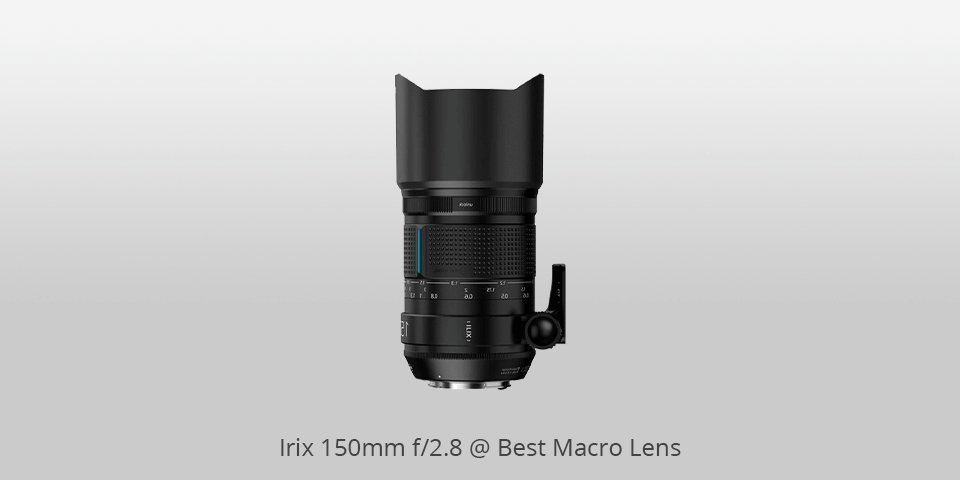
Mount: Canon EF | Diaphragm blades: 11, Rounded | Autofocus: No | Min focus distance: 34.5 cm | Max magnification: 1x | Filter size: 77 mm (Front) | Dimensions (ø x L): 87 x 135 mm | Weight: 840 g
⊕ Smooth and soft bokeh
⊕ Weather-sealed body
⊕ Suitable for portraits
⊕ Sharp images
⊖ Requires an adapter to attach it to mirrorless cams
IRIX 150mm f2.8 deserves attention for numerous features and fantastic image quality packed in a lightweight body. 11 aperture blades, weather-sealed construction, incredibly sharp optics, these are just some features that make this IRIX model one of the best close-up lenses. Despite numerous premium features, IRIX 150mm f2.8 lacks an AF system. Nevertheless, this is a decent option among all the reviewed models, especially if you use it in full disclosure.
| Image | Name | Features | |
|---|---|---|---|
 |
Canon EF-S 35mm f/2.8
Our choice |
CHECK PRICE→ | |
 |
Tamron 90mm F/2.8 Di
Premium |
CHECK PRICE → | |
 |
Olympus M.Zuiko 30mm F3.5
Budget |
CHECK PRICE → |
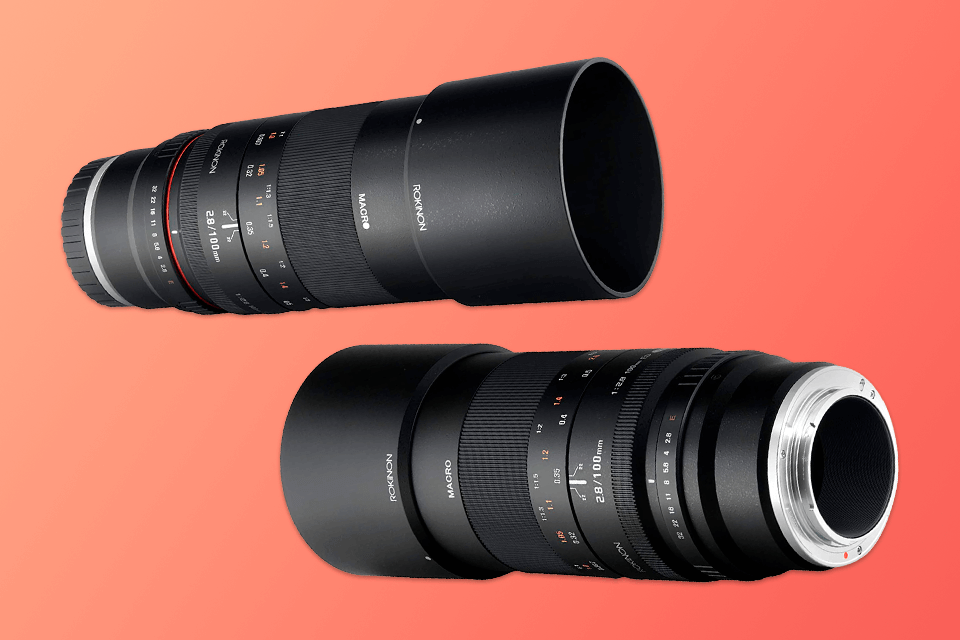
Magnification is an essential factor to consider when shopping for the best macro lens. Although true macro lenses include the word “macro” in their names, manufacturers of other lenses may comprise it as well for marketing purposes. True macro lenses project the subject onto the sensor at a 1:1 ratio and 1x in lens specifications. With the help of a macro lens, you can make the small objects appear life-size. So, if you photograph a 1cm insect at 1:1 or 1x, it would occupy as much of the scene as if you placed it on the sensor.
The larger aperture you use, the shallower depth of field you will achieve. Fast aperture lenses usually have a higher price compared to slow aperture lenses. The difference in one stop can significantly increase the price of the lens. If you photograph at a wider aperture, your macro lens will render beautiful bokeh. The faster the aperture, the softer bokeh will appear in the image. Moreover, the longer you set your focal length, the shallower the depth of field you will get for the same aperture.
Some closeup lenses come with a built-in image stabilization system. Such lenses are more expensive, but there is another aspect to pay attention to. Image stabilization will come in handy if you want to get close to the distant subjects, but it almost useless if you are going to take close-ups. If you are shopping for a macro lens and are planning to use it for other purposes, for example, take portrait photos, then the lens with integrated image stabilization will be a wise choice. In case you are going to shoot only macro images, go for a money-saving option, and choose a non-stabilized lens.
In macro photography, the term magnification often refers to a reproduction ratio. A true macro lens is defined as a lens having a reproduction ratio of 1:1 to make the subject appear life-size on a camera's sensor. Some zoom lenses employ so-called macro features, but they don't give effective magnification. Nevertheless, some true macro lenses can deliver far more than a standard ratio. You can consider the models with a reproduction ratio of 2:1 or even 5:1.
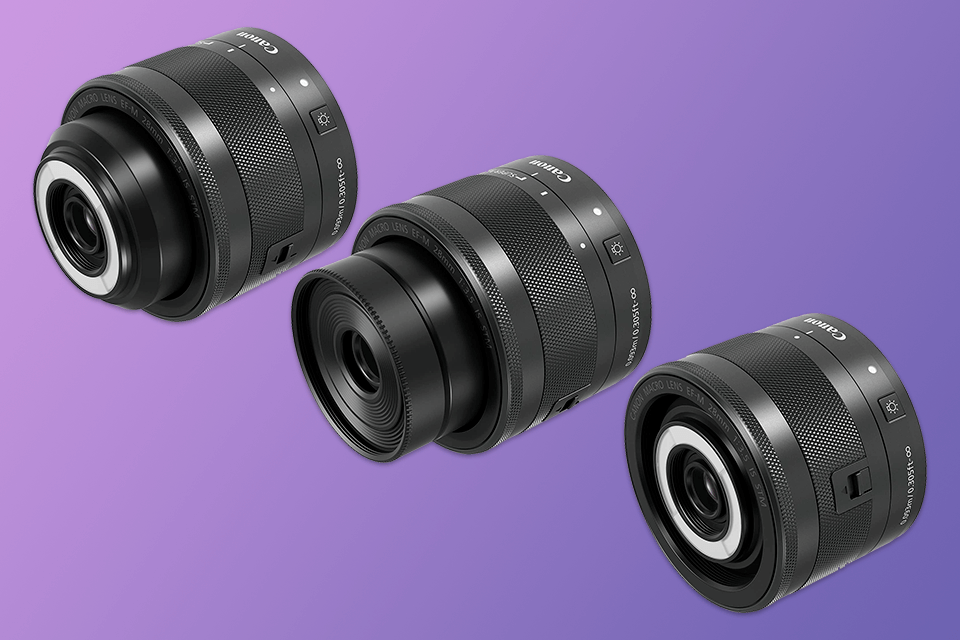
The majority of macro lenses include an AF system, while there are models only with manual focusing capabilities. However, it isn’t a strong drawback as it may seem. Manual focus is useful if you mount your camera on a tripod. It is often faster and more accurate than trying to manipulate and position AF points.
You can use a macro lens not only for macro photography. If you are engaged in several photography genres and want to try taking macro shots, picking the macro lens will be a nice choice.
This overview doesn’t include Nikon lenses, so you’d better consider Canon EF-S 35mm f/2.8.
No. The lens with a 50mm focal length isn't suitable for macro photography. Since it has a large aperture and shallow depth of field, it refers to a prime lens which is suitable for taking portraits or pictures of food. You will need a special macro lens for close up work.
Canon EF-S 35mm f/2.8

 Rating
Rating